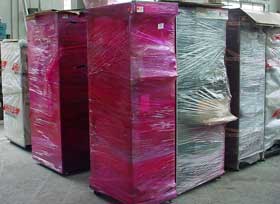Wanted: Someone to save Australia's IT heritage

The archives of the Australian Computer Museum Society, which has been collecting the IT industry's dinosaurs since the 1960s, is at risk of going to the dump, as the Society is being pushed out of its home for the second time.

The collection in storage
Credit: The Australian Computer Museum Society
The Society has kept bits of mechanical computers from the 1920s and calculators from even earlier than that. The relics include punch card machines, pieces of SILLIAC -- one of Australia's first computers belonging to the University of Sydney -- and personal computers that date from before IBM was a player in the industry.
Originally the collection was stored at Homebush, but when the site was earmarked for local development, the society moved it to a warehouse in south-west Sydney's Minto. The arrangement was such that it could use the premises for free until a commercial customer was found. Now that time has come and, unable to pay the rent for the warehouse, the Society needs to find a new home for the collection.
The Society has approached the National Trust, four universities and the Powerhouse Museum as well as Dick Smith and other business contacts for a home, but without any luck.
Unfortunately, although businesses have been receptive, their interest is limited, John Deane, president of the Society, said. "They only want to preserve their own history, they don't want to preserve their competitors' history."
It is important that the collection be maintained, Deane said, because people use computers every day, but have no idea where they come from. "There's just a very big hole in people's knowledge," he said.
"There's a whole lot of things to celebrate in Australian computer history," he continued, adding: "We have a startling history of computer innovation. It needs to be kept alive."
Credit: The Australian Computer Museum Society
The collection is unique worldwide, according to Deane. In other countries, old systems have been destroyed to protect industrial secrets. However, in Australia, this hasn't been the case. Deane said: "A few crazies saved them."
This has meant that the Society has been able to provide copies of technical information for American and British computer history museums.
Firms occasionally also benefit from the collection: about once a year the Society gets requests to rescue ancient company records by copying or changing media.
The material has no material value but it's irreplaceable, Deane said.
"If we attempted to replace it on eBay it would cost millions," he said, although the items wouldn't be available on the online auction site anyway, he admitted. "There's only a small number of people as crazy as we are around the world," he said.
If the Society does not find a home for its collection the relics of Australia's IT past will go to the rubbish tips and the metal recyclers, according to Deane.
Deane urges anyone who can help with funding, or warehouse space, or a location where the ACMS could build a big shed, to get in touch with him on 0427 404 429.
When asked where he would like the new home for his museum pieces, Deane said: "Anywhere we could get at," although somewhere like Penrith would be ideal. The Society will need 400 square metres to transfer the whole collection.
Anyone who makes an appointment can see the collection, Deane said.